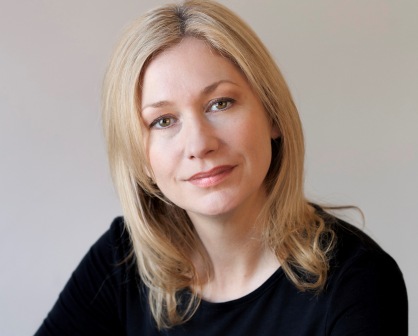Q&A. Sisters in Crime Australia national co-convenor, Robyn Walton, caught up with Tania Chandler about her second crime novel, Dead in the Water (Scribe, Melbourne, 2016, being launched at Readings Carlton on 13 October.
Hi, Tania. Congratulations on having your first novel, Please Don’t Leave Me Here, shortlisted for the 2016 Davitt and Ned Kelly debut awards. And thanks for giving us this follow- up novel.
Thank you, Robyn. And to Sisters in Crime for being such an amazing support to women writers.
Brigitte is back. You enjoy writing her?
Yes, I loved writing Brigitte. She’s a flawed character who often makes bad decisions. She’s funny, tragic, endearing and, I think, very human.
Having had the experience of writing the first book and finding out how it was received by general readers and reviewers, did you go about the planning and writing any differently this time?
I had written most of Dead in the Water (DITW) before Please Don’t Leave Me Here (PDLMH) was published. I don’t think about readers or reviews while I’m writing — I write stories that I’m passionate about, that are interesting and challenging to me. However, I did have in mind the suggestions from my editor and first readers about foreshadowing and setting up the ending in PDLMH — I tried to do those better in DITW. I also had a deadline the second time around, so I had to learn how to be more efficient in my writing time.
Brigitte has moved to an island. She’s hoping she and her family will feel safer, happier and healthier there than they did in the city, where some traumatising things happened. But with Brigitte afraid of the water and drowning, what are the chances?
Not good!
Water frightens most people on some primal level. It’s cold, dark and foreboding. It’s where the bad guys throw their guns and dump bodies with cement shoes. It’s where Norman Bates dumps the car with Marion’s body in the boot. It’s where Private Investigator Phillip Marlowe finds the lady in the lake, unrecognisable and bloated from decomposition.
Add to water, isolation — a tiny island where there’s no way off after the last ferry leaves for the night. Not to mention, of course, a protagonist who is afraid of the water.
I used the setting to create a brooding sense of tension and to reflect characters’ moods.
 Domestic busyness is unavoidable in Brigitte’s life. You decided to give it prominence in the storyline?
Domestic busyness is unavoidable in Brigitte’s life. You decided to give it prominence in the storyline?
I try to write characters that are believable. I think the struggles of ordinary people can be compelling. Brigitte is equipped with a family and domestic concerns — something many novels sideline. A busy working wife and mother she is ultimately, like most of us, just trying to do her best.
How do you feel about the labels that could be applied to your novel: domestic noir, regional crime, psychological thriller, suspense, and so on?
This is the kind of question I try to skirt around when somebody finds out I’m a writer and wants to know what genre. I used to say ‘Literary thrillers’ or go off on a tangent about how my work is hard to categorise. Now I just say ‘Psychological thrillers’ because I don’t have a better alternative.
A friend once called my writing ‘dirty realism’ and I quite like that one! I’m over the moon just to be published, and I try to concentrate on writing and not worry too much about what my books will be labeled and into which box they’ll be packaged.
To quote David Mitchell: ‘The novel’s the boss, and arguments about marketing categories are not the writer’s concern.’
Aidan, Brigitte’s second husband, is a good man (handsome too). But he’s uneasy when a former boyfriend of Brigitte’s turns up in the area. And Brigitte is uneasy about Aidan’s new colleague, pretty blonde Carla. Love and jealousy can drive both main and secondary storylines?
Sexuality is an important part of Brigitte and Aidan’s relationship. When Aidan seems to lose interest in sex, Brigitte suspects he’s having an affair. At the same time she’s faced with the temptation of her ex returning to her life. So yes, love and jealousy are behind a lot of the tension in the story.
In a crime novel by her former boyfriend Brigitte notices a disturbing parallel between the opening episode and a distressing event close to her own home. At the same time Brigitte is trying to get through Cloud Atlas (by David Mitchell), a complicated novel made up of interconnected stories. You’re playing with the notions of life imitating art and stories nesting within stories?
Yes, I did want to play with the concepts of life imitating art, and stories within stories. It took me a long time to work out what book Brigitte should be reading. Cloud Atlas came to me because of a line in DITW about souls being connected and reincarnated time and time again, which is basically what Cloud Atlas is about. It’s also about good and evil, love and destruction, beginnings and endings — themes that reflect those in DITW. It is a complicated book that a friend recommends to Brigitte — I don’t think she would have chosen it for herself.
Tom Waits and Nick Cave lyrics are recurring references. Your comments?
Music has been important to both my books. Early inspiration for DITW came from Paul Kelly’s song ‘Everything’s Turning to White’, which was inspired by a Raymond Carver short story about a man who finds the body of a murdered girl in a river, and the fallout and how it affects his marriage.
Brigitte was a Nick Cave fan in PDLMH, so he had to be there again in DITW. Tom Waits — because I thought about the music Nirvana fans in the 90s of PDLMH might be listening to now that they’ve grown up. Tom Waits’s music is also connected to Brigitte’s friend Harry, and this is significant to the story.
As a detective Aidan deals with distressing situations. He is prone to nightmares and hyper-vigilance. PTSD or valid worry for his loved ones?
DITW deals with trauma and PTSD. I interviewed psychologists and police officers, and it seems that PTSD is almost an occupational hazard. Sadly, there is still a stigma attached to mental health issues — and the fear of losing their job — that prevents many officers from seeking help.
There’s tragi-comedy on display in the lives of Brigitte’s mother and brother. Brigitte’s trip to the city to audition for a TV commercial is a fiasco, and her efforts at standing in for a guest TV chef are funny. Your thoughts on using humour?
There’s a fine line between comedy and tragedy. I think Brigitte’s mother and brother are so funny because they’re such tragic fuck-ups. Painful and embarrassing moments can be the funniest — when they’re happening to somebody else, of course.
Without humour, DITW would have been a very dark book. I think Brigitte is a naturally funny character — she’s awkward, often silly, and makes bad decisions that end in disaster. I enjoy writing humour and found the funny parts the easiest to write.
Finally, Tania, are there other aspects of the novel you’d like to say something about?
I think we’ve covered a lot. There is, of course, a playlist to go with the book. You can find it on the DITW page of my blog: https://chandlertania.wordpress.com/dead-in-the-water/
Thanks, Tania.
Thank you, Robyn!
You’re all invited to the Melbourne launch of Tania Chandler’s, Dead in the Water by Janice Simpson – Thursday October 13 @ 6:00 for 6.30 pm – 7:30 pm. Readings Carlton Click here for details.
